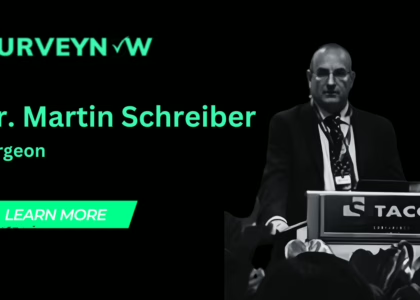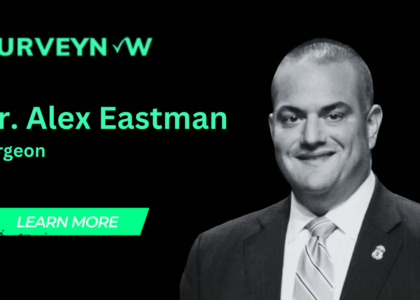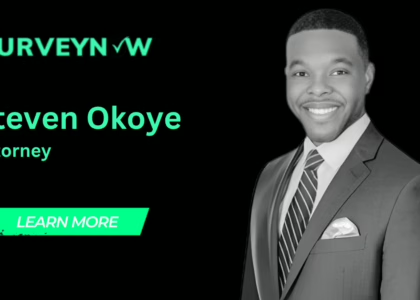Dr. Jay Johannigman has spent more than 40 years in the field of trauma and critical care and his work has helped shape how we treat injuries on the battlefield and in civilian emergency rooms. From advancing aeromedical transport to leading trauma teams in combat zones, he has built a career rooted in service, innovation, and leadership.
Now based at Centura’s St. Anthony Hospital in Colorado, Dr. Johannigman is planning a return to his hometown of Cincinnati to continue pushing the boundaries of trauma care. In this interview with SurveyNow, he talks about what success really means, why adaptability is key, and how riding his bike along the Ohio River helps him think.
What does success mean to you?
Success has always been about purpose for me, not prestige. Early in my career I realized I didn’t need a title to feel successful. Saving lives and seeing our work make an immediate difference was enough. That sense of purpose has driven me ever since. It’s not about chasing accolades. It’s about showing up when it matters and making a real impact.
What makes someone a good entrepreneur?
The best entrepreneurs and the best medical leaders are consitently curious. They don’t settle for “this is how we’ve always done it.” They ask why. They imagine better ways forward. And more importantly, they’re not afraid of change. Whether you’re starting a company or leading a trauma team, the ability to adapt is what keeps you moving forward when things shift unexpectedly. SurveyNow often features stories about professionals embracing this mindset on its blog.
What challenges did you face starting out?
One of the biggest shifts in my career was moving from military to civilian medicine. In the military, things are often fast, direct, and mission-focused. Civilian healthcare, on the other hand, can be slower and more collaborative. It took time to adjust. But learning to find balance ultimately made me a stronger leader. I began to see how both systems had strengths and how much they could learn from each other.
What’s a trend you’re excited about?
The return of whole blood in trauma care is a game changer. It started in the military, and now we’re seeing real success bringing it into civilian settings. Instead of separating blood into parts, we use it as-is, just like the body needs it.
In Denver, we’ve taken steps to get whole blood into the field, onto ambulances, helicopters, and right to accident scenes. That means care starts before the patient even reaches the hospital. Early intervention with whole blood reduces complications and can dramatically increase survival rates.
This is one of those rare cases where military innovation is improving civilian outcomes in real time. Denver is leading the charge, but I believe this model could spread nationwide. If more EMS teams carried whole blood, the lives saved could be in the thousands.
What advice would you give your younger self?
Don’t be so afraid of making mistakes. I was cautious early on, sometimes too cautious. I thought failure would set me back or make people question whether I belonged in leadership roles. But the truth is, the biggest leaps I’ve made came from taking calculated risks.
Some of the best decisions I’ve made, whether adopting battlefield methods in civilian trauma care or stepping into new roles before I felt “ready,” only happened because I trusted my instincts. Playing it safe might keep you comfortable, but it won’t help you grow. Growth happens when you lean into uncertainty and see what’s possible.
What helps you stay productive?
Exercise is my foundation. A morning run or quick gym session clears my head and gives me energy for the rest of the day. I also practice mindfulness. Ten minutes of quiet reflection makes a huge difference in how I handle stress, make decisions, and solve problems. It’s not just about physical health. It’s about showing up with clarity and resilience.
What do you do when you’re overwhelmed?
Honestly, I get on my bike. Riding along the Ohio River helps me reset. There’s something grounding about seeing familiar streets and thinking back on where it all started. It reminds me why I do this work. I also reach out to people I trust. Whether it’s a colleague or a friend, those conversations often bring fresh ideas or just the perspective I need to refocus. Sometimes, stepping away from the problem is the best way to solve it.
Final Thoughts
Dr. Jay Johannigman doesn’t define success by rank or resume. His legacy is one of impact through innovation, mentorship, and a steady focus on what truly matters saving lives and improving systems.
Whether pioneering battlefield medicine or reshaping civilian trauma care, he has always stayed curious, collaborative, and unafraid to challenge the norm. His efforts with whole blood trauma treatment and forward-thinking leadership continue to influence medical communities across the country.
As he returns to Cincinnati, it’s clear he’s not slowing down. He’s coming home to keep building. You can learn more about his work and vision by visiting his official website.
Curious how SurveyNow helps leaders like Jay gather feedback and drive improvement? Start your free trial and experience how simple and powerful data collection can be.





